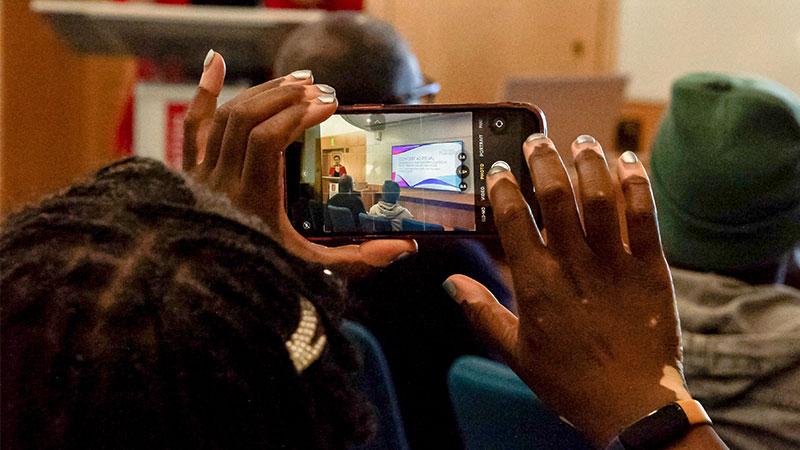Organised by the University of Westminster , researchers, musicians and business leaders came together at the British Library on 20 October to explore the history of Black British music and its cultural significance.

The event was open to the public and gave people the opportunity to come and listen to presentations from academics, music researchers and business music organisations who discussed a range of topics related to Black British music.
Dr Pinar Uysal Onganer, Reader in the School of Life Science, spoke about Prostate Cancer and Black musicians in her talk titled Harmonising Health: Prostate Cancer and African-Carribbean Musicians. Her presentation was followed by Professor Andrew Groves, Professor of Fashion Design and Dr Danielle Sprecher, a Menswear Curator at Westminster, who discussed Representing Black British Music in the Westminster Menswear Archive.
About her presentation Dr Uysal Onganer said: “Prostate cancer is the most prevalent cancer among men worldwide, with Black men facing a 50% higher risk compared to their Caucasian counterparts. Various factors, including age, diet, obesity, smoking, drug use, alcohol consumption, circadian rhythm disruptions, race and sexual activity have all been identified as contributors to an elevated risk of prostate cancer. Musicians, due to their lifestyles, often contend with these risk factors. It's worth noting that famous male guitarists from bands spanning recent decades are now reaching the age group most closely associated with prostate cancer. Thus, it's unsurprising that they may fall into the at-risk category.
“The Black Music Symposium presented a unique opportunity to discuss these risk factors and barriers, aiming to understand why Black musicians face a higher risk of prostate cancer and how to break the stigma surrounding prostate cancer diagnosis. I really enjoyed talking about the issues in depth and hope to continue these conversations amongst African-Caribbean musicians.”
Dr Jasmine Taylor, a Senior Lecturer in Westminster’s School of Arts, also took to the stage to talk about how well-known female artists may be affected by features of historical erasure. For the presentation, she focussed on Billie Holiday, looking at how even though over the past ninety years much has been written about her in books, articles and the popular press, and she can be recognised as having a place in popular culture, there are aspects of her life and career which it can be argued are subject to historical erasure. To demonstrate this, she focussed on two letters which Holiday sent to a British fan in the late 1930s that she discovered when undertaking research at the National Jazz Archive in Loughton.
About the event she said: “The event was one of great significance for those of us interested in Black popular music in the UK. I was struck by the diversity of topics, as well as by the diversity of contributors. The symposium clearly showed that there exists individuals committed to carrying out research in this area and it is to be hoped that this symposium is just the beginning; that it can be an event that takes place annually or even bi-annually. I really enjoyed the variety of subjects and left feeling that I wanted more.”
Other talks included an exploration of Black Christian and Gospel music, a discussion on the ways in which West African music has influenced British music production and cultural identity for British people of African descent, and a presentation on the role of Black musicians in the development of military music.
The Black Music Research Unit (BMRU) at Westminster aims to give Black British-born individuals greater access and ownership of their history within academia and spotlight artists who have been overlooked throughout history. Its Director Professor Mykaell Riley hosted a weekly episode each week on Virgin Radio, during October exploring Black bands and artists who have shaped music and popular culture across the UK.
Find out about more events taking place as part of Westminster’s Black History Year.







